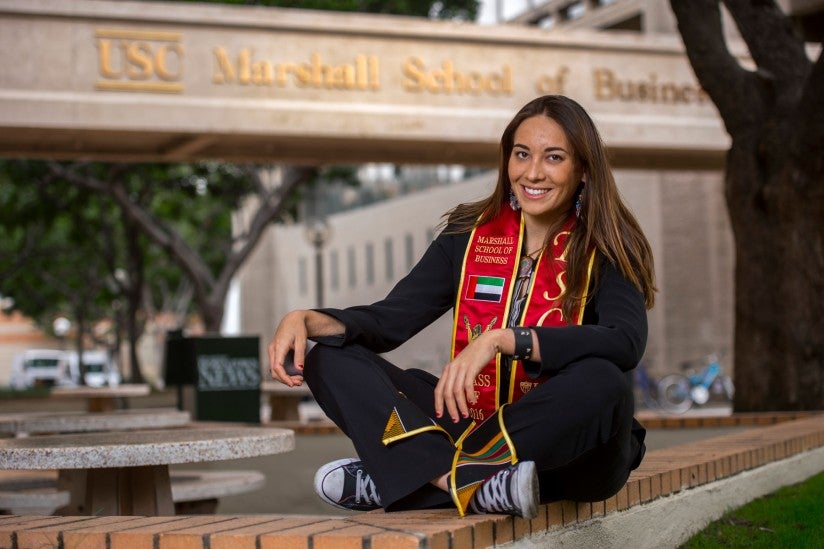Tips for college transfer student success, from a transfer student
A new USC Marshall graduate shares advice from her own experience starting school at Los Angeles Harbor College

Transferring from a community college to USC can be daunting, inspiring and even life-changing. It certainly opens up a world of new opportunities. I transferred from Los Angeles Harbor College into the USC Marshall School of Business and wanted to share my lessons learned with future transfer students.
The bottom line: Get involved, stay involved and make the most of your time on campus.
Here are a few more tips:
1. Get used to email as your main form of communication with the university.
Los Angeles Harbor College, where I transferred from, had an email system but rarely used it. Half of the teachers there didn’t even have access. This changed at USC. I began receiving up to 15 emails a day from USC, and at first it was really overwhelming. If you get the hang of reading and responding to emails early, you won’t miss key events that are pivotal in your transition to USC, and you’ll get all of the busywork out of the way before arriving on campus.
2. Do your research on transfer credits and decide if you want to do a minor or progressive degree ASAP.
USC has a different unit-acceptance policy than many of the other schools in the area, and it is best to make sure that you have fulfilled all of the requirements possible before starting at USC. This will help you save money and allow you to focus on your major credits and the leftover general education requirements while you’re here.
If you want to earn a minor in addition to your degree, talk about it with your adviser early to map out the necessary courses. Doing so later may mean you’ll need to add more semesters to your education. Earning a minor as a transfer is not impossible, but there is just a small window of opportunity to take advantage of them. USC also offers a progressive degree so you can earn your master’s as well as your bachelor’s, but the cutoff to begin is 96 units. If you transfer in with 64 units, that doesn’t leave a lot of time to decide, so the quicker the better.
3. Find a mentor and put yourself out there early.
It has been proven that transfers succeed more under the guidance of a mentor. The USC Marshall School of Business has great programs like the Career Advantage Program and others that allow you to connect with people in your interested field. You can also reach out to professors and others who CAN inspire you as well. A good mentor will know how to navigate the campus, connect you to the right resources and put you in the places where you’ll thrive and succeed. This person is going to take the time to get to know you and inspire you be the best Trojan you can be.
4. Go abroad.
You may think a trip abroad is too expensive, but there are several programs at USC that are not only a good fit for transfers, but provide options in helping you pay for the cost of the experience. I feel like this is a key part of applying what you learned in the classroom to a real-world experience. It broadens your horizons and shows you so much more than you could ever learn from a book. The connections I made allowed me to enhance my networking skills when returning to campus in ways I never thought possible. You will learn so much about yourself as well as a new place and make some of the best friends you can have at the university. My abroad buddies are definitely the roots of my Trojan Family tree, and they are people I know I can count on for the rest of my life.
5. Go to events, even if it cuts into your study time.
USC is a huge school and it is easy to get lost in the shuffle of all that is happening on campus and the commitment you have to excel in the classroom. There is always someone who has similar interests as well as gatherings of people who do the things you like to do. These people will become your best friends and key players when navigating the university and preparing postgrad plans as well. Don’t get so bogged down studying that you forget to attend events and gatherings, for they are what make your experience valuable in the long run.



